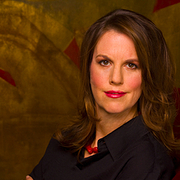Elizabeth KostovaEntrevista
Autor de La historiadora
Entrevista con el autor
 Elizabeth Kostova's debut novel, The Historian was a hugely popular historical mystery. Switching gears from Dracula, it's an art mystery that drives Kostova's second novel The Swan Thieves, which is poised to follow in The Historian's bestselling path.
Elizabeth Kostova's debut novel, The Historian was a hugely popular historical mystery. Switching gears from Dracula, it's an art mystery that drives Kostova's second novel The Swan Thieves, which is poised to follow in The Historian's bestselling path.
Elizabeth graduated from Yale and holds an MFA from the University of Michigan, where she won the Hopwood Award for the Novel-in-Progress.
All of the main characters are painters of some sort. You write intimately about these characters—both how they experience the world with an artist's eye, and how they generally have paint under their nails. How did you go about capturing all the pieces that make up someone whose passion is painting?
I know several painters well, and they were generous enough to let me interview them about their day-to-day work, their decisions, and their techniques. I also got to follow one of them during landscape painting and to observe a studio class at an excellent art league. This was all a huge help to me in putting together my painter characters.
 What were the first pieces that came together to form the story?
What were the first pieces that came together to form the story?
I'd known for a long time that I wanted to write a book about a painter and about paintings, and to take on the challenge of describing paintings in words. And I also wanted to write about a link (a fictional one, in this case) between contemporary painters and art history.
The Swan Thieves uses letters written by characters to convey some of the story, including one letter imagined by the main character, between two other characters. The Historian is an epistolary novel as well. What does the use of correspondence provide for you as a writer?
I think we all have a secret wish to read other people's letters, or thoughts, and using letters gives the writer/reader very direct and intimate access to a character.
What was your process to come up with fictional paintings?
I thought about what I needed from them for the plot of the book and then tried to see my invented paintings in my mind's eye, as if they were hanging on a wall in front of me. Sometimes I did a little (very bad) sketch for myself of what I imagined, so that I could keep my descriptions consistent.
Robert Oliver doesn't speak for most of the book, and we learn the most of him through the other characters. Why did you choose to show us who he is through the eyes of others?
I was interested in the experiment of trying to build up one figure through other people's voices.
What's a piece of art that speaks to you? (This is like asking 'do you have a favorite painting', without you having to "like" it, and without having to chose one over others.)
Thanks for making this question a little easier! I love all the work of Berthe Morisot, which inspired some of the scenes in The Swan Thieves—her extreme skill with line and form, the delicacy of her colors, the intimacy of the family scenes she portrays.
You mentioned in a Q&A at the Harvard Bookstore that as you were writing The Swan Thieves, you weren't sure how it would end. Considering it has a mystery component, what was that experience like?
It was exciting. I had to work on faith, figuring out the mystery as I went along.
I hear you're working on your third novel. Do you plan on continuing to write books that require lots of research, or move on to something different?
I keep hoping that I'll write a novel that doesn't require immense historical research, but I've already started a third novel that will definitely require it.
You've created the Elizabeth Kostova Foundation, which helps support Bulgarian creative writing, including the translation of contemporary Bulgarian works. Would you share a few suggestions of novels from Bulgarian authors?
Bulgarian authors are just beginning to publish again in English, which is exciting to see. I like Natural Novel by Georgi Gospodinov, which is available on the Web from Dalkey Archive Press.
What's on your bookshelf?
I recently read A Tale of Two Cities—for the first time!—which was thrilling, as well as a fantastic English novel—also about art and psychiatry, actually—called The Other Side of You, by Salley Vickers. Now I'm reading The Impressionist (that refers to a character, not to paintings!), by Hari Kunzru.
—interview by Sonya Green
